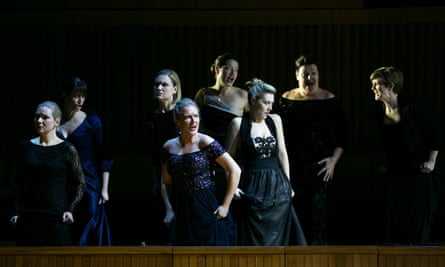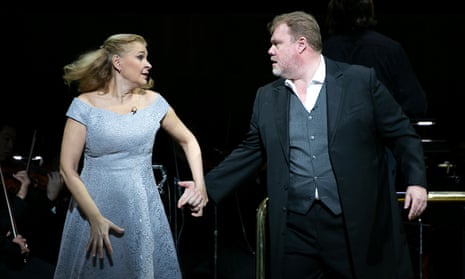VladimirJurowski and the London Philharmonic are working their way through a semi-staging of Wagner’s Ring cycle, presenting one opera each year until 2021, when Jurowski steps down as the orchestra’s principal conductor. He’s an accomplished, at times painstaking Wagnerian, and his Walküre, for the most part, revealed yet again his understanding of the crucial relationship between speed and pace in this music, and his careful judgment of cumulative momentum and the dramatic flux within it.
He brought lyrical warmth and genuine eroticism to the first act, and plenty of fine-tuned detail to the psychological fluctuations of the second, which he likens, in a programme interview, to “an Ibsen play put inside a Homer epic”. Act three opened with a high-voltage Ride of the Valkyries, though there was a brief, uncharacteristic dip in tension at the start of the Wotan-Brünnhilde duet. Sounding lean and sinewy throughout, the LPO played with scrupulous care and considerable intensity.

The singing was uneven, though the best of it was impressive. Stuart Skelton made a formidable Siegmund, thrilling in his anguished cries of “Wälse! Wälse!” yet passionate, refined and almost bel canto in his scenes with Ruxandra Donose’s Sieglinde. A mezzo rather than the more usual soprano, she sounded taxed in places in act one, and was cautious rather than expressionistic in the delirium of act two, though Oh Hehrstes Wunder soared magnificently when she reached it in act three.
Wotan and Fricka were played by Markus Marquardt and Claudia Mahnke. His voice can fray in its upper registers, though he finely captured the self-deception and rage that lurks beneath Wotan’s authoritative reserve. A tremendous vocal actor, Mahnke, all wounded pride and hauteur, showered him with barely disguised contempt in their scene together. Svetlana Sozdateleva was the tireless, metallic-sounding Brünnhilde, Stephen Milling the chillingly brutal Hunding.
The semi-staging, for which no director was credited, was clean and clear in its treatment of the protagonists, though the indiscriminate use of video projections of foliage, storms, fire and smoke proved at times distracting.

Comments (…)
Sign in or create your Guardian account to join the discussion